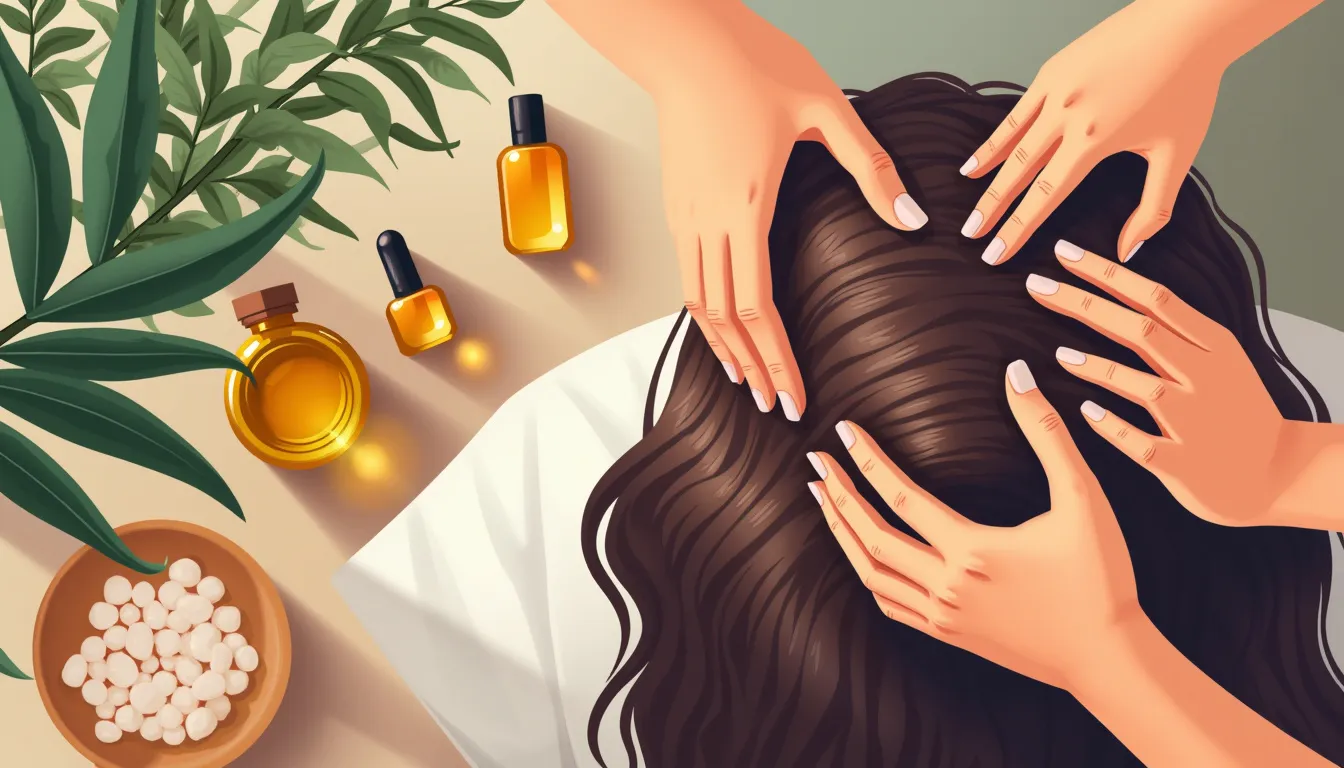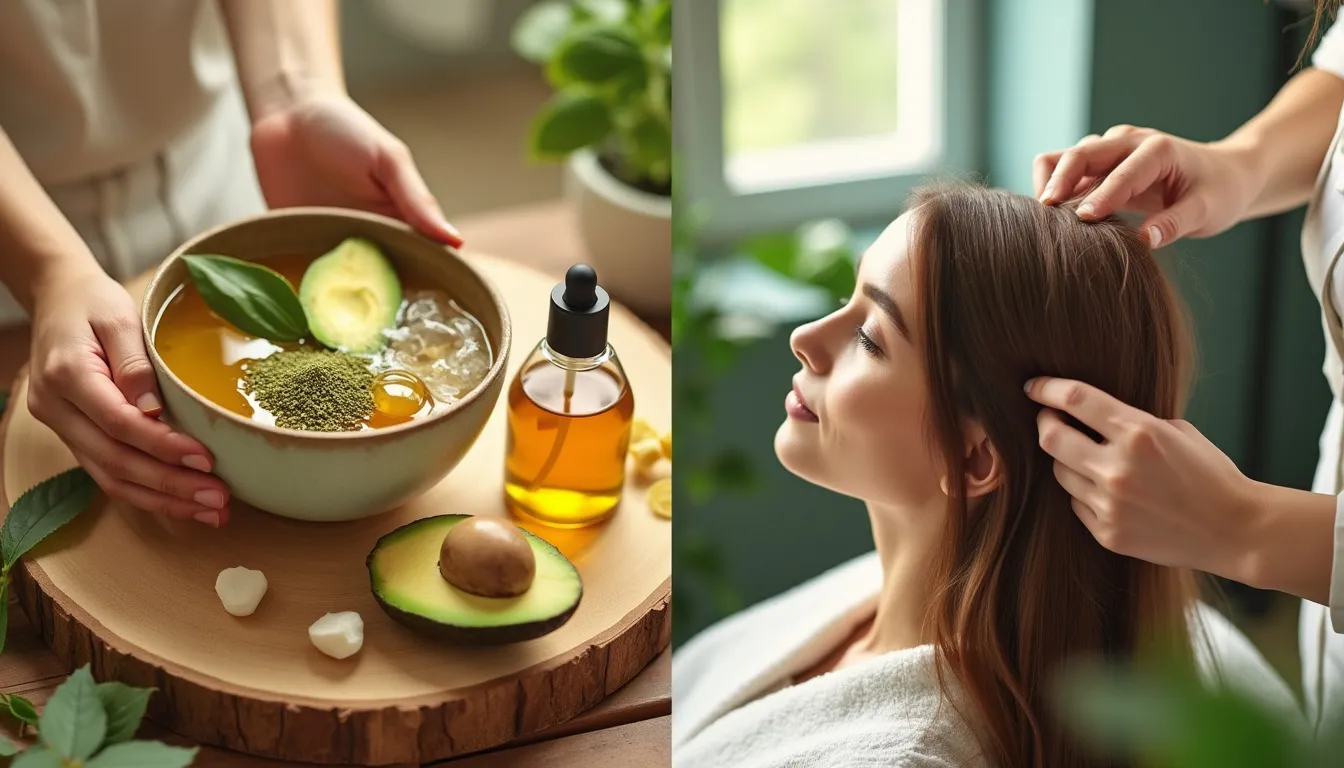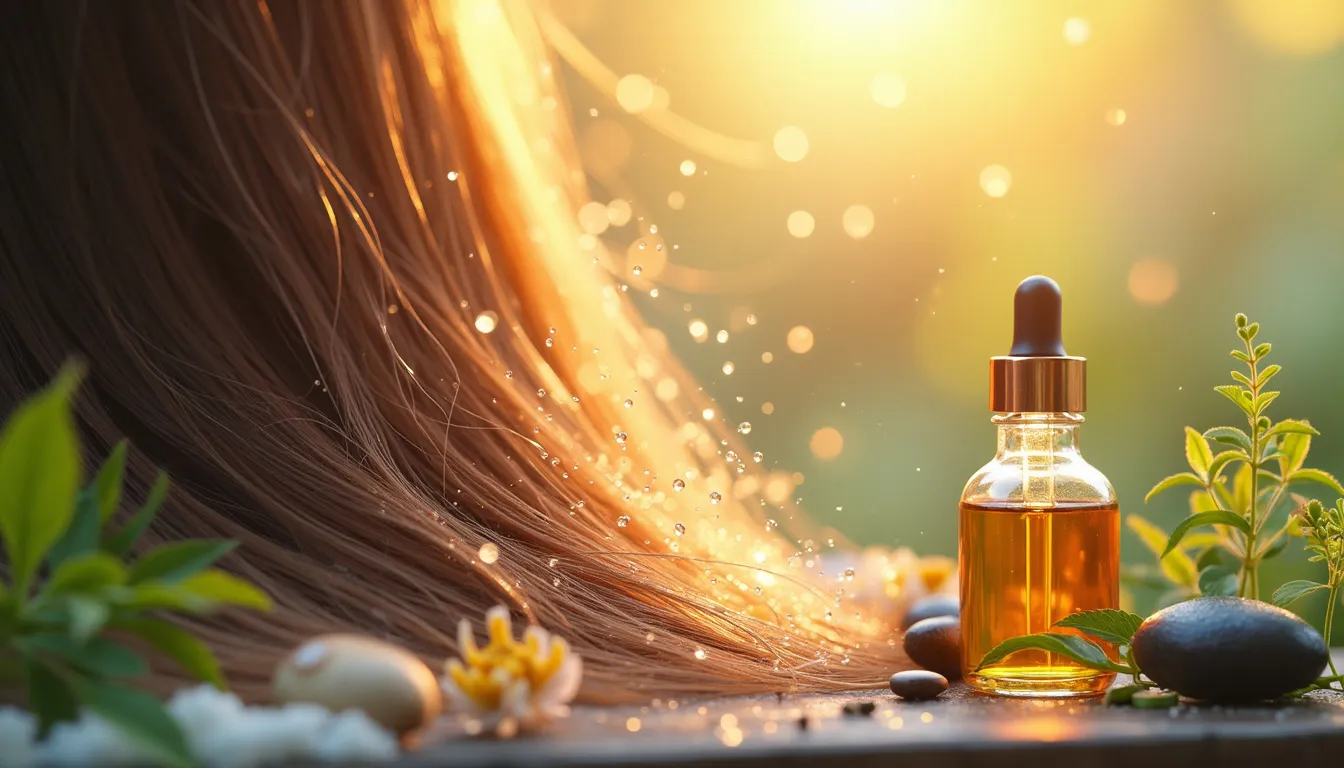Are you tired of battling with lackluster locks, persistent dandruff, or unexplained hair loss? The secret to luscious, healthy hair might be hiding right beneath the surface – your scalp. Often overlooked in our hair care routines, a healthy scalp is the foundation for vibrant, strong hair. In this comprehensive guide, we’ll dive deep into the world of scalp treatments, exploring how these powerful solutions can transform your hair from the root up.
From exfoliating scrubs that banish buildup to moisturizing masks that soothe irritation, scalp treatments offer a myriad of benefits for every hair type and concern. Whether you’re dealing with dryness, excess oil, or specific conditions like psoriasis, there’s a scalp treatment tailored to your needs. We’ll uncover the science behind scalp health, reveal the telltale signs that your scalp is crying out for attention, and introduce you to a range of effective treatments – from DIY remedies you can whip up in your kitchen to professional services that pack a powerful punch.
Get ready to embark on a journey to revitalize your hair and boost your confidence. By the end of this article, you’ll be equipped with the knowledge and tools to give your scalp the TLC it deserves, paving the way for the healthiest, most beautiful hair of your life. Say goodbye to bad hair days and hello to a happier, healthier you – starting with your scalp!
Understanding Scalp Health and Its Impact on Hair
When it comes to achieving luscious, healthy hair, many of us focus solely on the strands themselves. However, the secret to truly vibrant locks lies beneath the surface – in the health of our scalp. The scalp is the foundation of hair growth, and its condition plays a crucial role in determining the quality and quantity of our hair. Let’s dive into the world of scalp health and explore why it’s so important for achieving the hair of your dreams.
The Importance of a Healthy Scalp for Hair Growth
Your scalp is more than just the skin covering your head; it’s a complex ecosystem that nurtures and supports hair growth. A healthy scalp provides the ideal environment for hair follicles to thrive, leading to stronger, shinier, and more resilient hair. Here’s why maintaining scalp health should be a top priority in your hair care routine:
- Nutrient Delivery: A well-functioning scalp ensures that essential nutrients and oxygen reach the hair follicles, promoting healthy growth and preventing hair loss.
- pH Balance: The scalp’s natural pH level is crucial for maintaining a protective barrier against harmful bacteria and fungi. A balanced pH also helps keep your hair cuticles closed, resulting in smoother, shinier hair.
- Oil Production: Sebaceous glands in the scalp produce natural oils that moisturize and protect both the scalp and hair. A healthy scalp regulates oil production, preventing issues like dryness or excessive oiliness.
- Cellular Turnover: Regular shedding of dead skin cells on the scalp is essential for maintaining clear follicles and promoting new hair growth.
By prioritizing scalp health through regular scalp treatments, you’re setting the stage for healthier, more beautiful hair from root to tip.
Common Scalp Issues and Their Effects on Hair
Unfortunately, various factors can disrupt the delicate balance of our scalp, leading to a range of issues that can negatively impact hair health. Some common scalp problems include:
- Dandruff: This common condition causes flaking and itching of the scalp. While not harmful, it can be embarrassing and may lead to hair breakage if left untreated.
- Seborrheic Dermatitis: A more severe form of dandruff, this condition causes red, scaly patches on the scalp that can be itchy and uncomfortable.
- Psoriasis: An autoimmune condition that results in thick, scaly patches on the scalp. It can cause hair thinning and temporary hair loss in affected areas.
- Folliculitis: An inflammation of hair follicles that can lead to small, itchy bumps on the scalp. In severe cases, it may cause hair loss.
- Product Buildup: Excessive use of styling products can create a residue on the scalp, clogging pores and potentially leading to hair thinning.
These scalp issues can have various effects on your hair, including:
- Reduced hair growth and potential hair loss
- Increased hair breakage and split ends
- Dull, lifeless appearance
- Difficulty styling and managing hair
- Itching and discomfort that may lead to excessive scratching and further damage
Addressing these scalp concerns through targeted scalp treatments is essential for maintaining healthy hair and preventing long-term damage.
Signs That Indicate You Need a Scalp Treatment
Recognizing the signs of an unhealthy scalp is crucial for addressing issues before they escalate. Here are some telltale indicators that it might be time to consider a scalp treatment:
- Excessive Itching: If you find yourself constantly scratching your head, it could be a sign of dryness, dandruff, or other scalp conditions.
- Visible Flakes: Noticeable white or yellowish flakes on your scalp or in your hair are a clear indication that your scalp needs attention.
- Redness or Inflammation: Any areas of redness, swelling, or tenderness on your scalp should be addressed promptly.
- Oily or Greasy Hair: If your hair becomes excessively oily shortly after washing, your scalp may be overproducing sebum.
- Dry, Tight Feeling: A scalp that feels dry, tight, or lacks elasticity may be dehydrated and in need of moisturizing treatments.
- Hair Thinning or Excessive Shedding: While some hair loss is normal, noticeable thinning or increased shedding could indicate scalp issues.
- Persistent Odor: An unpleasant smell coming from your scalp, even after washing, may signal bacterial overgrowth or fungal infections.
- Scalp Acne: Pimples or bumps on your scalp can be a sign of clogged pores or folliculitis.
If you’re experiencing any of these symptoms, it’s time to consider incorporating regular scalp treatments into your hair care routine. Remember, a healthy scalp is the foundation for beautiful, vibrant hair.
By understanding the importance of scalp health and recognizing the signs of potential issues, you’re taking the first step towards revitalizing your hair. In the following sections, we’ll explore various scalp treatments and techniques to address common concerns and promote optimal scalp health. Don’t forget to check out this program for additional support in maintaining a healthy scalp and preventing hair loss.

Top Scalp Treatments for Various Hair Concerns
When it comes to maintaining healthy hair, the scalp is often overlooked. However, a well-cared-for scalp is the foundation for vibrant, strong hair. Let’s explore some of the most effective scalp treatments tailored to address various hair concerns.
A. Exfoliating Treatments to Remove Buildup and Dead Skin Cells
Just like your face and body, your scalp benefits from regular exfoliation. Scalp exfoliation helps remove dead skin cells, product buildup, and excess oils that can clog hair follicles and impede healthy hair growth.
- Physical Exfoliation: This involves using a gentle scrub or brush to manually remove dead skin cells. Look for scalp scrubs containing natural exfoliants like sea salt or sugar.
- Chemical Exfoliation: Products containing mild acids like salicylic acid or glycolic acid can help dissolve dead skin cells and unclog pores.
For an effective at-home scalp treatment, try mixing equal parts brown sugar and coconut oil. Gently massage this mixture into your scalp before shampooing. This natural exfoliant can help remove buildup while nourishing your scalp.
B. Moisturizing Treatments for Dry and Itchy Scalps
A dry, itchy scalp can be uncomfortable and lead to flaking and even hair loss if left untreated. Moisturizing scalp treatments can provide relief and promote a healthier environment for hair growth.
- Oil Treatments: Natural oils like jojoba, argan, or coconut oil can deeply moisturize the scalp. Apply warm oil to your scalp, massage gently, and leave it on for 30 minutes before washing.
- Aloe Vera: Known for its soothing properties, aloe vera can help calm an irritated scalp. Apply pure aloe vera gel directly to your scalp and rinse after 15-20 minutes.
- Hydrating Masks: Look for hair masks that contain ingredients like hyaluronic acid or glycerin, which can help attract and retain moisture in the scalp.
Remember, while these treatments can be helpful, persistent dryness or itchiness might indicate an underlying condition. If symptoms persist, consider consulting a dermatologist or trichologist.
C. Clarifying Treatments for Oily Scalps and Product Residue
An oily scalp can lead to limp, greasy-looking hair and may even contribute to issues like dandruff. Clarifying treatments can help balance oil production and remove product buildup.
- Apple Cider Vinegar Rinse: Mix one part apple cider vinegar with three parts water. After shampooing, pour this mixture over your scalp and hair, then rinse thoroughly. The acidity helps balance pH levels and remove residue.
- Clay Masks: Bentonite or kaolin clay can absorb excess oil and impurities. Mix the clay with water to form a paste, apply to your scalp, and rinse after 10-15 minutes.
- Tea Tree Oil Shampoo: Tea tree oil has natural clarifying properties and can help control oil production. Look for shampoos containing this ingredient for regular use.
While addressing oiliness, be careful not to over-cleanse, as this can lead to increased oil production. Aim for balance rather than completely stripping your scalp of its natural oils.
D. Targeted Treatments for Specific Conditions
Some scalp conditions require more specialized treatments. Here are some common issues and potential solutions:
Dandruff
Dandruff is a common scalp condition characterized by flaking and sometimes itching. While not serious, it can be persistent and embarrassing.
- Anti-Dandruff Shampoos: Look for products containing zinc pyrithione, selenium sulfide, or ketoconazole. These ingredients can help control the yeast that often contributes to dandruff.
- Tea Tree Oil: Add a few drops of tea tree oil to your regular shampoo. Its antifungal properties can help combat dandruff-causing yeast.
- Scalp Masks: A weekly mask containing ingredients like salicylic acid or coal tar can help reduce flaking and soothe the scalp.
Psoriasis
Scalp psoriasis is a more serious condition that causes red, scaly patches on the scalp. While it requires medical management, certain scalp treatments can help alleviate symptoms:
- Medicated Shampoos: Products containing coal tar or salicylic acid can help reduce scaling and itching.
- Steroid Solutions: Prescription topical corticosteroids can help reduce inflammation and slow cell turnover.
- Light Therapy: Controlled exposure to UV light, under medical supervision, can help improve symptoms of scalp psoriasis.
Seborrheic Dermatitis
This condition causes red, scaly, and sometimes oily areas on the scalp. It’s similar to dandruff but more severe.
- Antifungal Creams: Prescription creams containing ketoconazole or ciclopirox can help manage symptoms.
- Medicated Shampoos: Products with selenium sulfide, zinc pyrithione, or coal tar can be effective when used regularly.
- Scalp Oils: Tea tree oil or neem oil can help soothe the scalp and reduce symptoms when applied regularly.
Remember, while these scalp treatments can be effective, persistent or severe scalp issues should be evaluated by a healthcare professional. They can provide a proper diagnosis and recommend the most appropriate treatment plan for your specific condition.
By incorporating these targeted scalp treatments into your hair care routine, you can address various concerns and promote a healthier environment for hair growth. A healthy scalp is the foundation for beautiful, vibrant hair, so don’t neglect this crucial aspect of your hair care regimen.
For more information on maintaining a healthy scalp and preventing hair loss, check out this comprehensive hair loss prevention program. It offers valuable insights and strategies to keep your scalp healthy and your hair strong.

DIY Scalp Treatments and Professional Options
When it comes to maintaining a healthy scalp, you have a range of options at your disposal. From DIY remedies you can whip up in your kitchen to professional treatments administered by experts, there’s a solution for every scalp concern. Let’s explore these options to help you achieve optimal scalp health and, consequently, luscious locks.
At-home scalp treatment recipes and techniques
DIY scalp treatments are not only cost-effective but also allow you to control the ingredients that come into contact with your skin. Here are some easy-to-make scalp treatments you can try at home:
- Apple Cider Vinegar Rinse: Mix equal parts water and apple cider vinegar. After shampooing, pour the mixture over your scalp and massage gently. Rinse thoroughly. This treatment helps balance your scalp’s pH and remove product buildup.
- Coconut Oil Massage: Warm up some coconut oil and massage it into your scalp. Leave it on for 30 minutes before washing it out. This nourishing treatment can help soothe dry, itchy scalps and promote hair growth.
- Tea Tree Oil Blend: Mix a few drops of tea tree oil with a carrier oil like jojoba or almond oil. Apply to your scalp and leave for 15 minutes before rinsing. Tea tree oil has antifungal properties that can help combat dandruff.
- Aloe Vera Gel Application: Apply pure aloe vera gel directly to your scalp. Leave it on for 30 minutes before rinsing. Aloe vera can help soothe irritation and promote a healthy scalp environment.
When applying these treatments, it’s crucial to massage your scalp gently. This not only helps the product penetrate better but also stimulates blood flow to the hair follicles, promoting healthier hair growth. Remember to patch test any new ingredients before applying them to your entire scalp to avoid potential allergic reactions.
Over-the-counter products for scalp care
While DIY treatments can be effective, sometimes you need the targeted approach of professionally formulated products. Here are some over-the-counter options to consider for various scalp concerns:
- Scalp Exfoliating Scrubs: These products help remove dead skin cells and product buildup. Look for ingredients like salicylic acid or gentle physical exfoliants.
- Medicated Shampoos: For issues like dandruff or seborrheic dermatitis, shampoos containing zinc pyrithione, ketoconazole, or selenium sulfide can be effective.
- Scalp Serums: These targeted treatments often contain ingredients like niacinamide or caffeine to improve scalp health and promote hair growth.
- Scalp Oils: For dry or itchy scalps, look for oils enriched with ingredients like tea tree, peppermint, or rosemary, known for their soothing properties.
When choosing over-the-counter scalp treatments, it’s essential to consider your specific scalp concerns and hair type. What works for one person may not work for another, so don’t be afraid to experiment with different products to find what works best for you.
Professional scalp treatments and when to seek expert help
While at-home treatments and over-the-counter products can address many scalp issues, sometimes professional intervention is necessary. Professional scalp treatments offer more intensive care and can be particularly beneficial for persistent or severe scalp conditions.
Some popular professional scalp treatments include:
- Scalp Facials: Similar to a facial for your face, these treatments cleanse, exfoliate, and nourish your scalp.
- Micro-needling: This treatment involves using tiny needles to create micro-injuries in the scalp, stimulating collagen production and potentially promoting hair growth.
- LED Light Therapy: This non-invasive treatment uses different wavelengths of light to address various scalp issues and promote hair growth.
- Trichological Treatments: These are specialized treatments provided by trichologists, experts in scalp and hair health.
Consider seeking professional help if you experience:
- Persistent scalp issues that don’t respond to over-the-counter treatments
- Sudden or excessive hair loss
- Severe scalp pain or inflammation
- Scalp conditions that significantly impact your quality of life
A dermatologist or trichologist can provide a proper diagnosis and recommend a tailored treatment plan for your specific scalp concerns. They may suggest a combination of in-office treatments, prescription medications, and at-home care routines to address your scalp issues effectively.
Remember, maintaining a healthy scalp is an ongoing process. Whether you opt for DIY treatments, over-the-counter products, or professional interventions, consistency is key. Regular scalp care can lead to healthier, stronger hair and prevent many common hair and scalp issues.
For those looking for a comprehensive approach to hair health, consider checking out this hair loss prevention program. It offers a holistic strategy to combat hair loss and promote overall hair health, complementing your scalp care routine perfectly.
In conclusion, maintaining a healthy scalp is crucial for achieving vibrant, beautiful hair. By understanding the importance of scalp health and recognizing the signs that indicate the need for treatment, you can take proactive steps to address various scalp concerns. Whether you’re dealing with dryness, oiliness, dandruff, or other specific conditions, there’s a scalp treatment tailored to your needs.
From exfoliating and moisturizing treatments to clarifying solutions and targeted therapies, the array of options available ensures that you can find the perfect scalp treatment to revitalize your hair. Whether you prefer DIY methods, over-the-counter products, or professional treatments, investing in your scalp health is an investment in your overall well-being and appearance.
Remember, a healthy scalp is the foundation for healthy hair. By incorporating regular scalp treatments into your hair care routine, you’ll not only address current issues but also prevent future problems from arising. Your scalp and hair will thank you for the extra attention, rewarding you with improved texture, shine, and overall health.
So, why wait? Start your journey towards a healthier scalp today. Experiment with different treatments, listen to your scalp’s needs, and don’t hesitate to seek professional advice when necessary. With patience and consistency, you’ll soon notice the transformative effects of proper scalp care on your hair and confidence.
Lastly, if you’re looking for an additional boost in your hair care routine, consider checking out the Fortify program at hairsecurity.net/fortify. This comprehensive approach to hair health can complement your scalp treatments and help you achieve the luscious, healthy hair you’ve always dreamed of. Remember, beautiful hair starts with a healthy scalp – so treat it with the care it deserves!
